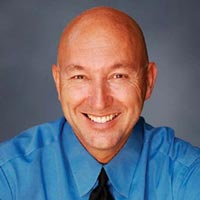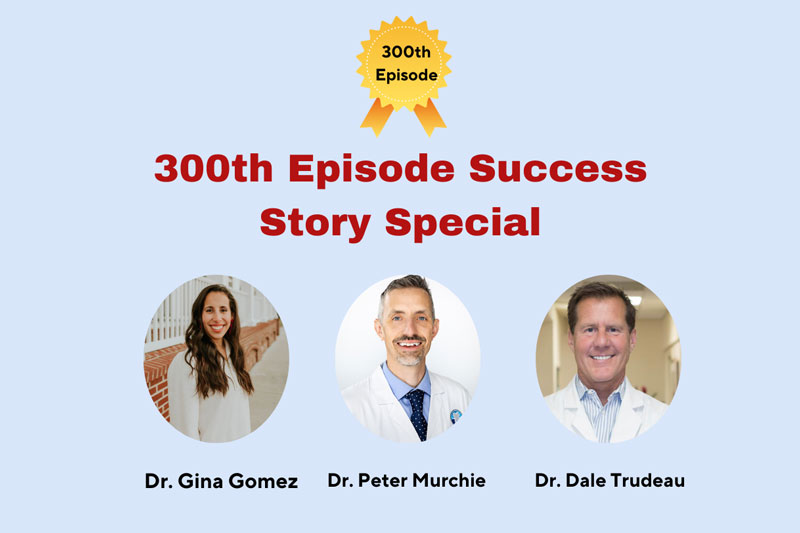Episode #302: You Can Have a Profitable Practice AND Serve Those In Need
Listen Now
It is not unusual to see dental practices with high cancellations and no-shows in today’s dental world. It’s very frustrating when dentists face a high number of no-shows and cancellations, and it hurts the dental practice in many ways. Therefore, this has become one of the crucial problems that need to be solved.
In this episode, Gary will share the method he teaches his coaching clients to reduce the number of no-shows and cancellations in their dental practices; he shares a method that has time and time worked on increasing the number of patients who keep their appointments!
When your patients show up for their appointments, it simply puts your dental practice in a better financial position, and you get the opportunity to help more patients.
If you, too, are a dentist frustrated with the number of no-shows and cancellations in your dental practice, make sure to listen to this episode.
There is no one perfect practice model that will be suitable for all dental practices out there.
And that’s the beauty of owning a dental practice. You could make it your own by picking the most suitable practice model!
Gary Takacs came up with the 2.5 Million Dollar Practice Model Masterclass by considering all the characteristics of a thriving practice. Therefore, no matter your current practice model, you can learn methods to improve your dental practice by joining the 2.5 Million Dollar Practice Model Masterclass! This is a model that flat out works every time!
You can learn more and register for the Masterclass by visiting:
http://www.lessinsurancedependence.com/masterclass/
Naren: Hello everyone, welcome to the Less Insurance Dependence podcast, the official podcast of the Reducing Insurance Dependence Academy, www.rid.academy. Please consider this an invitation to become a member of RIDA as a gift from us in appreciation of your listenership. This is Naren, your co-host. Today’s topic is ‘Training your patients to keep their appointments’ Training your patients to keep their appointments.
Before we get into today’s topic, I have a quick announcement: We have our favorite Thriving Dentist master class, ‘The $2.5 million practice model’, happening on July 27th. This is the second time Gary is ever doing this, and we are bringing it back because many of the people who couldn’t make it said, "Can you please, please, please, do this because we think we are going to benefit a lot from this?" In this particular master class, he is going to go into exactly how to think about a $2.5 million practice, the things you need to pay attention to, and how you eventually get there. So, he’s going to provide practical advice; it’s three hours of CE, July 27th, 7.00 – 10.00 pm Eastern. It’s live, so you will literally get to interact with Gary in person via Zoom from the comfort of your home. We limit the number of seats, so please check out the thrivingdentist.com/masterclass/, and if there are seats still available, please sign up as quickly as you can.
Gary: About that master class, you know, there are many different practice models, but I’ve been asked, you know, many times by many dentists, "Is there one perfect practice model?" and the actual answer to that is, "No, that’s the beauty of owning your practice. You can make it your own." But I came up with this master class on the $ 2.5 million practice model because it is a model that will provide the characteristics of a thriving practice. The characteristics of a thriving practice are one that provides personal, professional, and financial satisfaction. Personal satisfaction means that you are taking care of patients you enjoy, surrounded by the people you love, professional satisfaction means you are doing more of the kind of dentistry you love, and financial satisfaction is you are being rewarded handsomely for your care skill, and judgment. And this is a model that will flat out do that every time, so I’ll be sure in that model with you. It’s also one that provides, has the capability of providing a really nice work-life balance. I’m a champion of helping dentists achieve work-life balance because if we achieve success at the expense of our family, of our relationships, then I would argue that’s no success at all. So come join us on July 27th, the $2.5 million practice model; you will have tips you can apply the next day. So, come join us.
Naren: Thank you, Gary, and I think today’s episode is going to be a fun one because this issue of no-shows is a chronic issue for many, many practice owners. In both Ekwa Marketing and Thriving Dentist coaching programs, we have a lot of mutual clients, and I’ve seen many mutual clients struggling with this early on, and then with your help, they continue to get better and better and better. So I’m looking forward to it because I’m assuming you’ll be talking about your secrets today, Gary.
Gary: Yeah, let’s face it. Cancellations/no-shows are an epidemic in practices all over today. So if you are experiencing that, you’ve got a lot of company. It’s quite literally an epidemic, and I hope you change that because it’s very, very frustrating when we get cancellations/no-shows, and it can hurt a practice in many, many different ways. So I want to show you something we teach in our coaching that is something that you can apply, and how this relates to the topic of our podcast – Less Insurance Dependence – is that we want to have butts in the seats for you in your practice, whether it is on the doctor’s side or whether it is on the hygienist’s side. And we want to reduce the number of cancellations/no-shows because it will simply put your practice in a stronger financial position. You are able to help more patients; you can’t help patients if they don’t show up for their appointments. So it’s one of those very crucial problems to solve, and the great news is I’m going to share with you something you’ve seen time and time again completely change that occurred in your practice of cancellations/no-shows. Alright, I need to present one more kind of overview, and then we’ll dive into the strategy. So one more overview comes from Dr. Phil, the famous television personality/ psychologist, you know, on TV, and Dr. Phil has famously said, "You train people how to treat you," and I believe that to be true. Naren, would you accept that statement? I believe that to be true, how about you?
Naren: Yes, I do.
Gary: Yeah, you train people how to treat you, and if you look at a very core level, there might be many reasons why people make cancellations/no-shows. It could be mundane circumstances; the car battery was dead, the babysitter didn’t show up, they got called into an emergency meeting at work, okay, and any number of other reasons. But at a very core level, the reason why people don’t show up is that they can’t. One of the consequences of not showing up, I mean there could be consequences, some practices have a no show fee or cancellation fee, many of those practices will waive those, you know, it’s kind of, you know, a consequence that doesn’t have much punch, right? So I want to talk about the opposite; instead of punishing them for not showing up, I want to train them to show up, train them to be there. So what do you think about how you could do this? And we teach a new patient experience. I’ll show the way we teach our clients, and you could adapt this to your office. And so we teach a new patient experience, but really it becomes an experience. It’s more than appointments. It sort of locks them into never wanting to go anywhere else for their dental work; they become patients for life. And only in that appointment do you go through an interview process, a new patient coordinator does a seven-question interview, and the purpose of that interview is to learn the patient’s dental history very quick; it doesn’t take very long, but we learn their dental history, it’s a way for us to connect with our patients, to learn their past history with dental care and their oral health. At the end of that interview in the consulting room, the new patient coordinator will turn to the patient and say, "Susan, you know, I sure appreciate seeing you as a new patient today. In our practice, we love seeing new patients, and you made a great decision to come here for your care. We are going to work really hard to take awesome care of you. Susan, may I take a minute to share with you what you can expect as an active patient in our practice?" if you nod your head, this is neurolinguistic programming; if you nod your head, "Susan, can I take a minute and explain what you can expect?" What is the patient gonna do in response as you are nodding your head as you ask that question?
Naren: They are going to say, "Absolutely."
Gary: They are going to nod their head right along with you and say, "Sure." (Naren: Yeah). "Susan, there are four things you can expect from us: Number one, we are going to treat you like we would a family member or a loved one. I know it sounds — (1:10:30 not clear), but we think of our patients as our patient family. We are going to take care of you like you are a family member. Number two, because of that, we are going to use the latest advances, the best materials, and the highest quality processes because that’s what we’ll expect if we are patient. Number three, we stand behind our work so that if anything isn’t right, we’ll do it until we meet our standards, and Number four," we’ll hand the patient a little business card at this point, "Susan, this is the protocol to reach our doctors after hours if you have any kind of dental concern requires, if you decide to reach the doctor. Here’s the protocol on this card. I encourage you to keep that in your personal wallet. Now, if it’s a routine, you can call the office and leave a message, but if you really feel you need to call the doctor, as an active patient of our practice, you absolutely have the right to do that. And here’s how to do that. Susan, now that I’ve shared with you what to expect from us, may I take a minute and show you what we expect from you?" I nod my head again. And what is the patient going to do? "Sure" (Naren: Sure) Yeah, you bet. Susan, it’s just one thing. We expect that if you make an appointment, you actually show up. No, no, no, no, no. We know that sometimes, things happen. In fact, I saw a bumper sticker on a car the other day that said, ‘Things Happen.’ Well, Susan, I didn’t say things, but you get the idea". They usually laugh and say, "Yes, I saw that bumper sticker too." Well, we get it; we understand that things happen, and if they do and when they do, all we ask is you kindly give us at least 48 hours if you need to reschedule your appointment. That gives us the time to schedule another deserving patient in that time slot. "Susan, does that sound fair to you?" And what is she (1:12:20 not clear) going to say?
Naren: Absolutely.
Gary: Let’s talk about the psychology behind this. I’ve given the patient four reasons, four that for most people are very meaningful reasons, to come here for their care. Given out four, I’ve asked for only one in exchange. It’s a pretty fair trade, isn’t it?
Naren: Yes, absolutely.
Gary: What I’m really doing is, I’m training her to give us 48 hours. That’s what I’m really doing. (Naren: Yes) If we have 48 hours, we can scramble. We can scramble and put a patient, whether it’s in hygiene or on the doctor’s side, we can scramble and fill that appointment, thereby reducing our cancellation and no-show record. Now, what we found is that this process really works to train patients to give you 48 hours. For example, when we are sending out confirmations for hygiene, we have two confirmation systems; one would be for reliable patients and another confirmation system for "at-risk" hygiene patients; ‘at risk’ refers to people who are at risk of not showing up. On our reliable confirmation system, we send out mainly text reminders on seven days, three days, and two days, and on the day of the appointment. When we send that first one out in seven days, many patients will get on the phone; some patients will call and say, "Linda, I got the reminder. I don’t know what I thought when I scheduled that. But next week is the week my crazy cousin’s getting married, and I need to reschedule that hygiene appointment. I know I have to give you 48 hours. And I’m giving you plenty of advance notice. "Now, she’s doing that seven days in advance. Notice the language that she used, Naren. (Naren: Right) What is that proof? That they now know the expectations. (Naren: Yes) And they will say, "I know I need to give you 48 hours, so I wanted to contact you today, to give you time, and that’s all I’m really asking for. Now I would be fibbing if I said this word one hundred percent of the time. I mean, you’re never going to have a cancellation/no-show? No, no, but you’ll be amazed at how effectively this works. Let them know what you expect. Let them know what you expect and do it in a give-and-take that benefits them. What’s in it for them? I like to joke that my favorite radio station is WIIFM. That’s not a radio station; that’s an acronym. It stands for ‘What’s In It For Me?’ WIIFM sounds like it could be a radio station. But in fact, no, what’s in it for me. And I’m giving four things; I’m treating you like family, isn’t that important to a person?
Naren: Absolutely.
Gary: We use the highest quality materials, we use the latest technologies, laser advances because that’s what we would want, and the patient identifies with that, Naren?
Naren: Yes, the patient definitely can identify with that, Gary.
Gary: We stand behind our work; the patient gets that.
Naren: They definitely get that. The biggest lesson I have learned from what you are sharing right now, Gary, is that a lot of people don’t differentiate between a doctor and, let’s say, going to their hair salon. And their mindset is, "Hair salon? I miss my hair salon appointment; who cares?"
Gary: I would actually argue that people don’t miss their appointments at the hair salon. There are many; there are many, many, many, including my wife, the hair salon my wife goes to that does not send confirmations. (Naren: Right) They don’t send because, you know what, they don’t need to. Their patient is not gonna show up. And we have to babysit people at dental offices. But I think we do that because we have trained people that they can blow off their appointments.
Naren: Yes, there are no consequences; there are no expectations. It’s just a —-
Gary: Even the language that is used, you know, when I hear on the phone when someone calls and says, "Oh, I have an appointment later in the day. I won’t be able to make it." And the patient will make up some kind of excuse, and the caller (1:16:30 not clear) will say, "Oh, that’s okay." But we know it’s not okay.
Naren: It’s not okay.
Gary: But we really need to go to the root cause, and the root cause is.
Naren: And the immediate response is, "When are you free?" So you are not dealing with what happened and the consequences.
Gary: Let’s put more texture on this, but the last one I want to complete the process of the patient value we’ve given them. Do they value being able to reach the doctor or doctors if there are multiple doctors? How to reach the doctor if there’s a dental concern. Will that be a valuable piece of information in a patient’s —? (1:17:05 not clear) You bet, you bet. And I’m only asking for one thing, a pretty easy thing for them to do, show up. "And all we expect is one thing, just one thing, Linda; we expect that if you make an appointment, you show up." No, no, no. (not clear) Now that sounds rigid and firm and like some big rule. Now we totally understand that things happen. And I love to use that line; in fact, I saw that bumper sticker the other day that ‘Things Happen.’ Everyone sees that bumper sticker; it doesn’t say —- (1:17:35 not clear); it says something else. And they laugh, and we laugh, and we know when things happen, all we ask is to give us 48 hours advance notice so that we can schedule one other deserving patient in that time slot.
Naren: I had a question for you, Gary. How do you … because the reason they blow up is, they think it’s not a big deal or not as important. So, how do you create value, or can you use …
Gary: Create value. Here’s what you get here. (not clear)
Naren: What I’m saying is, can you create value intrinsically like post-Covid? People really really appreciate taking care of their health. So by giving you this appointment, we are taking away from someone else. So, we really want to make sure that you can actually make it, and if you cannot…
Gary: Every appointment, every appointment, we let them know, we talk benefits statement. So, we make a hygiene appointment, we talk about it, so if we see you on a regular basis, Naren, we accomplish two things: We keep you as healthy as possible, and we reduce your future dental expenses. There’s no one end to that, you reinforce. We talk about the connection between the health of your mouth and your overall health. It’s not just about your teeth and gums; it’s about your overall health. We talk about that as well. You have to look at that as being an ongoing campaign to build value.
One more detail before we wrap up today: Should you have a cancellation/no-show fee? And here’s how I feel about that. If there are no consequences, then what’s in the way of someone just blowing off? So, I feel, on one level, a cancellation fee, a consequence should be there should be a consequence. But rather than, I’m going to give you a twist on this that we teach our clients that I think you’ll appreciate. So everyone gets one chance, and one gets an ideal free card for cancellation/no-show because it does happen; everyone gets one chance. But the second time it happens, we send out a certified letter, we do the old school-certified letter, you know, it goes by post, by mail, you are certifying, and it says, "Linda, we have a problem. We had scheduled you at 2 o’clock today for a dental appointment, and for some reason, you were not able to make it. Our accountant has suggested that we charge you a $150 broken appointments fee." And we make a certain number up, "$150 broken appointment fee. However, that doesn’t feel right to us, so we are not going to do that. What we are going to do is go on an honors system and simply ask you to keep your future appointments or give us 48 hours’ advance notice if you need to change them. Any future cancellations or no-shows within that 48 hours, you’ll need to be under the care of another dentist." Sincerely, the doctor." Tell her that if it happens again, notice the language. ‘If there is a cancellation/no show in the future without giving us 48 hours of advance notice, you’ll need to go under the care of another dental office’. And then, you bet that happens; you follow up on that. That’s how you end that. And let them go find another practice. Why do we lose our patients? Did you really lose one? If they don’t show up for their appointments, look at what they cost you; look at the way they have affected your practice. Let them go to someone else. I just want to put that texture on top of it. But I hope everyone heard the real gist of this podcast episode, which is training your patients to start right at the beginning and tell them what you expect of them. People often do what you expect of them if you just let them know what’s expected.
Well, as we wrap up this episode, there’s something you guys can use tomorrow in your practice. Today in your practice, there’s no cause (not clear). It will radically improve your kept appointments percentage, and we’ve had lots of success with this, and I know you will as well. Let me take a minute to wrap up and say thanks. Naren, thanks to you for co-hosting this podcast episode. Thanks for all that you and your team do at Ekwa to supply my practice with new patients in the work that you do with marketing. I also want to thank our listeners, and I do have a request for you. We love what we do here at the Less Insurance Dependence podcast, but we couldn’t do it without you. If you haven’t done so already, you can jump over to iTunes and write us a review, a review on our podcast on iTunes, the same way a Google Review works in your practice so that more dentists find us. So, if you are a dentist, jump over to iTunes and write us a review and let me close simply by saying thank you for the privilege of your time. We appreciate all of you; thank you.
 One of Gary's most significant achievements as a dental practice management coach is transforming his own practice, LifeSmiles, from one that was infected with PPO plans, no effective marketing strategy, and an overhead of 80% to a very successful dental practice that is currently one of the top-performing practices in the US.
One of Gary's most significant achievements as a dental practice management coach is transforming his own practice, LifeSmiles, from one that was infected with PPO plans, no effective marketing strategy, and an overhead of 80% to a very successful dental practice that is currently one of the top-performing practices in the US.
 As CEO of Ekwa Marketing, Naren has over a decade of experience working with dental practices and helping them attract the ideal type of patients to their practices. It is his goal to help dentists do more of the type of dentistry they love with the help and support of effective digital marketing.
As CEO of Ekwa Marketing, Naren has over a decade of experience working with dental practices and helping them attract the ideal type of patients to their practices. It is his goal to help dentists do more of the type of dentistry they love with the help and support of effective digital marketing.



